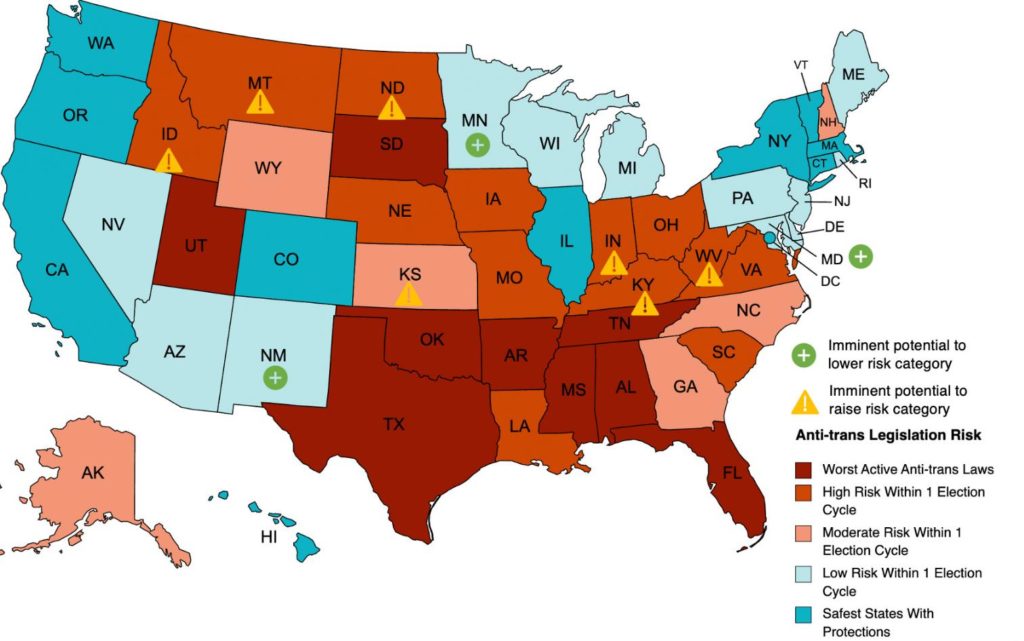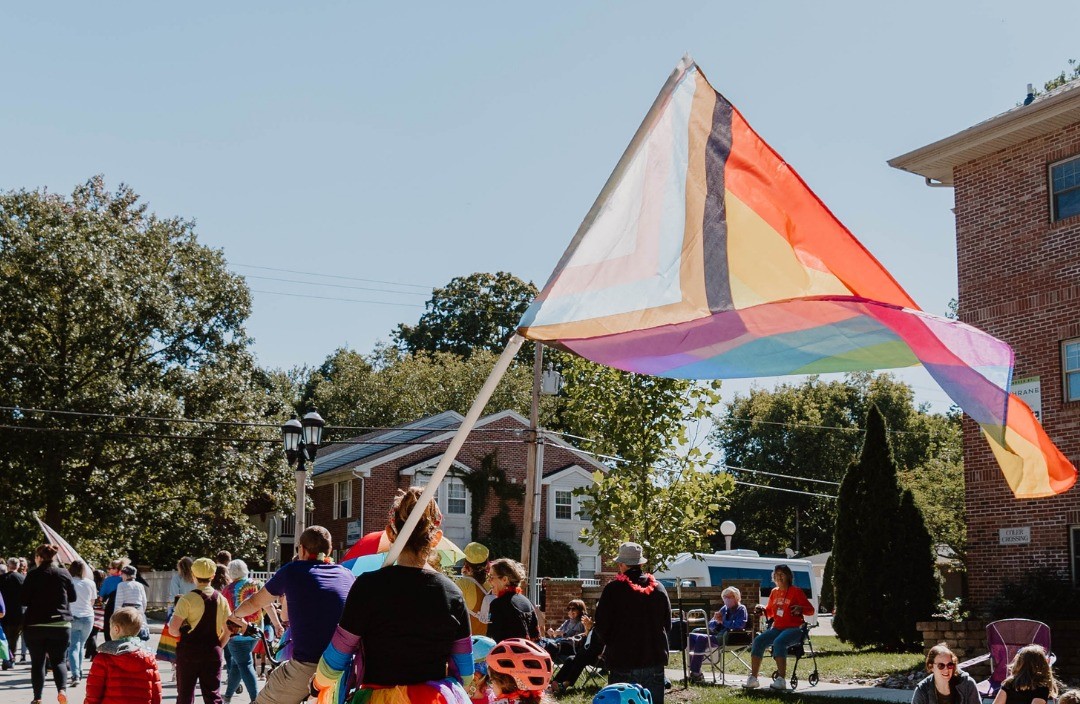You may have seen this graphic circulating in your social media feeds recently.

It was created by journalist Erin Reed, a trans woman, for the Los Angeles Blade. It depicts the level of anti-trans legislation in each state, and it is alarming. As residents of Illinois, we cannot ignore that we are a bright blue oasis in a sea of states that are danger zones for people who are transgender, or who exist outside of the gender binary. Though our neighboring states are not the most egregious, each have been enacting terrifying laws during recent legislation sessions:
- Iowa passed a bathroom bill, a ban on gender-affirming care for minors, and a replica of Florida’s “Don’t Say Gay” bill.
- Indiana passed a ban on gender-affirming care for minors, and parental notification if a student begins using different pronouns at school.
- Missouri passed a ban on gender-affirming care for minors and a ban on transgender athletes participating in sports that align with their gender.
- Kentucky passed a bill that bans gender-affirming care for minors, forces students in public school to use the bathroom of the sex that was assigned at birth, and allows teachers to ignore a student’s preferred pronouns.
In Illinois, the legislative picture is completely different thanks to a Democratic governor and Democratic supermajority in the state house. Our state is actively counteracting the discriminatory legislation happening in others. In January, Governor Pritzker signed House Bill 4664 into law, protecting access to gender affirming care and abortion, for Illinois residents and those traveling from more restrictive states. Last month, several bills passed through the Illinois House and Senate, headed for the Governor’s desk. One changes the language of existing laws concerning children in state care to eliminate gender binary-related language. Another requires “state agencies to track employees who identify as non-binary or gender non-conforming to help achieve workforce diversity.” Another makes it easier for LGBTQ+ couples from other states to marry in Illinois. Yet another “expands the potential for construction of gender-neutral bathrooms.” Illinois has also become the first state to end book bans, something that is playing out in library and school districts across the country, with books related to LGBTQ+ issues being pulled from shelves. More protective and gender inclusive measures are headed to the Governor’s desk soon, including a gender-neutral bathroom bill.
All that being said, we can’t take for granted that although we remain a consistently “blue” state election after election, Chicago plays a big role in that. We are otherwise living in a red state. One only needs to look at the comments from some Republican state legislators, including Chapin Rose of Mahomet, to be reminded of that.
Here in Champaign-Urbana, we live in the county that voted for Joe Biden in 2020 by the highest margins outside of Cook County. Being home to the state’s flagship university certainly helps those numbers, and contributes to making this community a generally inclusive one. Champaign County has an LGBTQ+ advocacy organization in Uniting Pride, which is continually expanding the depth and breadth of its work and reach, with a substantial collection of resources for all ages, including lists of businesses, health care providers, and affirming faith communities.
The City of Champaign has been recognized by the Human Rights Campaign Foundation for their “inclusive LGBTQ+ laws, policies, and services.” As noted by Urbana Mayor Diane Marlin, “Urbana became the first city in Illinois to pass a non-discrimination ordinance that included sexual orientation in 1975.” Champaign Unit 4 School District has an LGBTQ Task Force. Urbana District 116 has spelled out LGBTQIA+ rights and responsibilities.
Our community actively engages in both National Pride Month and our own Pride celebration in the fall, when students are here. Other Pride celebrations have surfaced in smaller, more conservative areas recently, including Danville, Paxton, and Tuscola.
Even with this level of local advocacy, there is room to fight for more: more recognition of gender diverse needs, more inclusion, more acceptance. About a year and half ago, we heard from several individuals in our community about how healthcare for trans- and gender- diverse individuals is lacking. With the state quickly becoming a safe haven for people in nearby states, we hope that providers are seeking to become more educated, and healthcare systems are seeking to provide the training and resources needed for providers to be able to give quality inclusive care.
Though the groundswell of support in communities that are more conservative is heartening, we can’t ignore that hateful rhetoric and bigotry exists, and that as we creep into election season, the discourse demonizing trans people in particular will intensify.
University of Illinois’ presence in the community contributes to this being a more progressive community, but the administration has not always voiced full support for LGTBQ+ students, faculty, and staff. U of I leadership missed a giant opportunity to affirm and support trans individuals when transphobic speaker Matt Walsh came to campus.
While there are thankfully many businesses in C-U that are affirming and welcoming spaces, as we wrote earlier this week, the need for more explicitly queer-owned, queer-operated, queer spaces for queer people is ever present. We also recognize that even in a progressive community such as ours, there are spaces and businesses that are unsafe for LGBTQ+ people.
This tweet from playwright Claire Willett has also been making the rounds on social media, a year after she first posted it, but obviously still relevant:
for pride month this year can straight people focus less on "love is love" and more on "queer and trans people are in danger"
— Claire Willett (@clairewillett) June 9, 2022
We need to be aware and willing to show up, push back, and listen when people say they are being harmed. In Illinois, and in C-U, the landscape of inclusion and acceptance is more promising than many other places across the country, but the work is never done.
The Editorial Board is Jessica Hammie, Julie McClure, Patrick Singer, and Mara Thacker.








